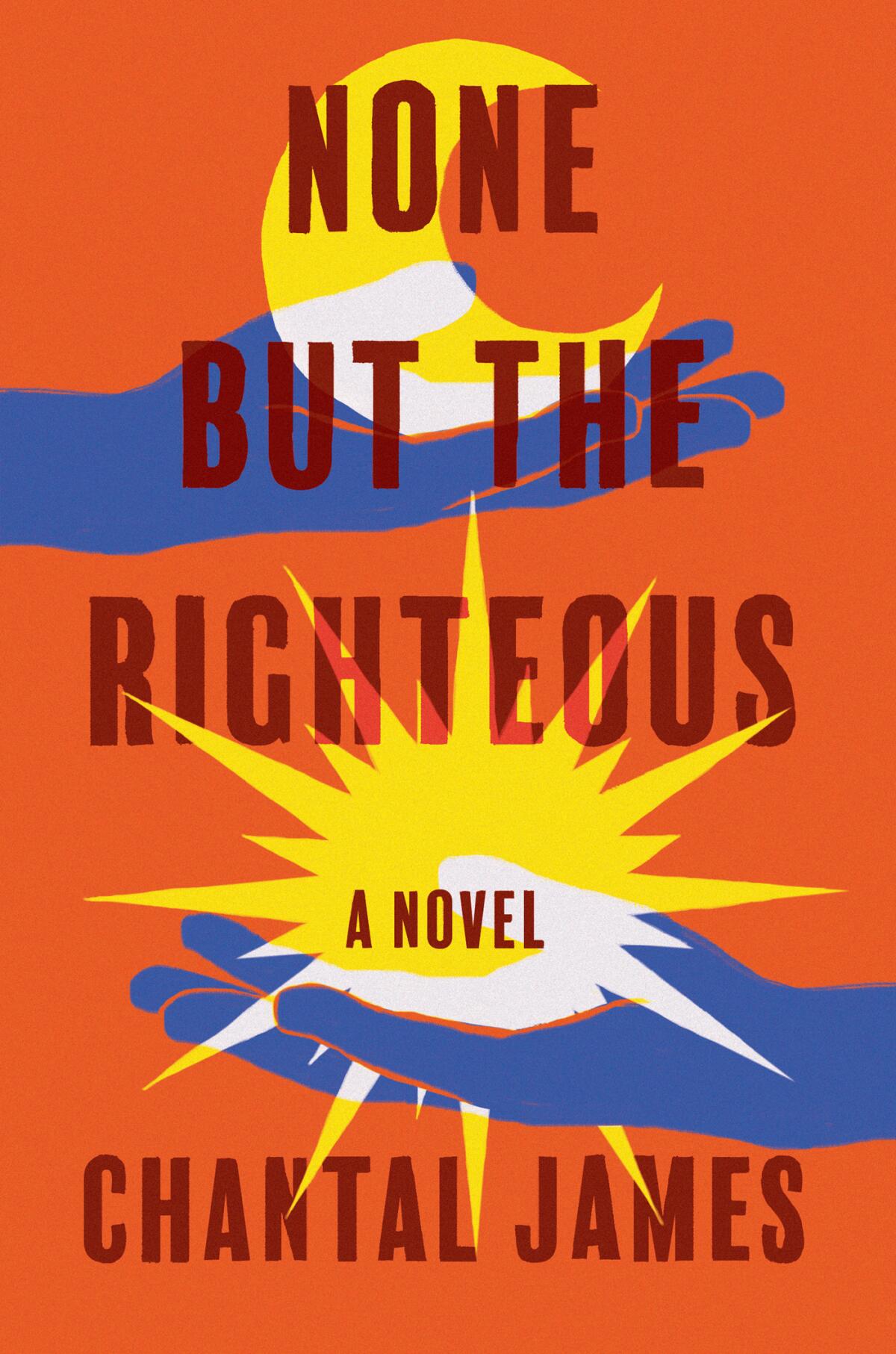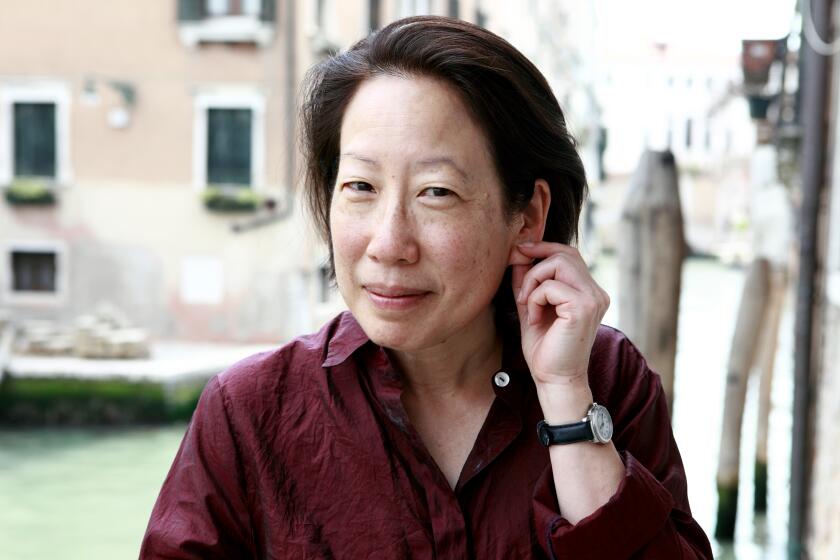Surviving the storms of New Orleans and Black history with help from a meddlesome saint

- Share via
On the Shelf
None But the Righteous
By Chantal James
Counterpoint: 240 pages, $26
If you buy books linked on our site, The Times may earn a commission from Bookshop.org, whose fees support independent bookstores.
What does it mean to be free? Throughout her profound debut novel, “None but the Righteous,” Chantal James demonstrates how hard it is to shake myths compounded by a legacy of injustice. In this deceptively slim book, she considers the layers of spirituality and history tangled in the aftermath of Hurricane Katrina through the eyes of one young man whose life reverberates with the beauty and horror of the city he calls home.
As Katrina approaches New Orleans, Ham (short for Hamilton) is 18, a Black man with no plan and nowhere to go. On a neutral ground (the strangely loaded but common name for a street median in New Orleans), he meets Deborah. Visiting from Alabama, she’s lost, but not as fundamentally as he is.
After a tumultuous childhood marked by absent parents, Ham was placed in a foster home with Miss Pearl, whose son, Wally, was roughly Ham’s age. What followed was a tale of neither redemption nor abuse. Theirs was a place where, “though he did not belong yet, he could work toward belonging.”
Miss Pearl had inherited the shotgun house, with its “meadow of overgrown weeds and fruit,” after her mother’s death. Like many New Orleanians, she was capable of carrying the sacred with the profane. The “resourceful” grandchild of a “well-heeled gris-gris queen of some renown,” Miss Pearl “wasn’t above adapting one of her MeeMaw’s charms to assure order was fixed in the world she ruled.” After Ham ran away for a week, Miss Pearl didn’t scold him; instead, to keep him home, she “chose a hex,” giving him a pendant containing a relic belonging to her grandmother.
Maurice Carlos Ruffin’s lauded debut novel disguised his hometown; his new short story collection, “Those Who Don’t Say They Love You,” faces the city head on.
Miss Pearl is the type of fanciful creature commonly spoken of in New Orleans — a woman at home with spells and prayer — but the metaphysical essence of the book rests in the relic itself. The animating spirit of that relic, the 17th century Peruvian saint Martin de Porres, whose bones were spread after his dismemberment, follows Ham throughout his life, inhabiting and influencing his dreams, movement, spirit and bones. Celebrated as the first Black saint of the Americas, he is also the book’s narrator.
“If you need someone to walk you and know the right methods, I shall,” says the relic. “The cost is your remembrance: if I walk through you, if I speak through you, you will recall little of it.” It’s easiest for the relic to inhabit Ham when he’s sucking on sugarcane or loose from drinking — prompting the relic to ask, “How much of Ham is himself anymore? It matters less than you think.”

Prayer and vice are two ways to fill the void left by a stunted childhood. Ham didn’t know what to pray for or how to inhabit a world that rejected him, growing up in a city (and country) cursed by a bloody history. He carries the weight of that history, standing in for a swath of society that is forgotten and denied its autonomy, whether through enslavement, incarceration, addiction or a simple lack of options.
This dense symbolism would be heavy-handed if not for James’ wry and intimate narration, which remains close to the bone and heart of its characters. James captures the simple kindnesses of a cup of coffee or a shared cellphone as though they were religious acts. Where a more ponderous writer might lapse into a lengthy stream of consciousness, James uses short chapters to weave a story of fractured time and uncharted space into the fabric of life after Katrina, as Ham and others make sense of new homes and upended lives.
When the saint-narrator was living, the “map’s center was not fixed… Common languages were broken between generations; the words of the father no longer suited the son. It’s still this way more than ever.” Too many people live out of sync. James’ novel deploys otherworldly elements to illuminate the dark spaces left by cruelty and chaos.
Bethanne Patrick’s January picks cover train wrecks, political drama, enraging inequality, the complications of polyamory and the joy of the ampersand.
Trapped in the pendant, the saint’s essence carried Ham through years of restlessness, filling that void of ambition and belonging — but never completely. Ham would search for familiar faces in crowds, aching for unknown relatives: “The longing found an easy home in him.” It stands to reason that such a man would passively evacuate to Alabama with a young woman. During their brief post-storm week together, Ham and Deborah conceive a child. Not ready for such responsibilities, he leaves her for Atlanta after tracking down Mayfly, an old friend with whom he would not “feel like a burden” or be “handled as a curiosity or a tragedy.”
Seven years earlier, Mayfly ran away from home to escape her immigrant parents’ upper middle-class expectations. She hopped trains, squatted in abandoned houses and let Ham “be her shadow” for a brief time. She responded to what lingered of his innocence; he was drawn to her rootlessness. Yet now, even she has made a home for herself. Through this journey from New Orleans to Alabama and then Atlanta, Ham begins to emerge as a free person, more than a body inhabited by a spirit or a person doomed by fate. “None but the Righteous” tracks this unusual awakening: recognizing self-worth and power through fragility, in the crucible of exodus.
He reawakens first to responsibility, returning to Alabama and Deborah only to leave again, seeking out Miss Pearl in New Orleans to see if it’s possible to find wholeness in its ruins. As the relic guides him, neither benevolent nor malign, Ham aches to be independent. The relic becomes a burden he must shed to move beyond his history. But to Ham, autonomy is an unknown country. His condition begs the question: What is freedom to those who have descended from enslaved people, and how do you even learn how to seize it?
Ham is bound by old gris-gris magic to New Orleans, Miss Pearl, bad habits and false realities. But we are all, in some ways, bound. Knowing which bonds to hold onto and which to abandon is a way of reckoning with the fact that, as the saint reflects, “we do not belong only to ourselves, that what loves us also seizes us.” Can Ham embrace the responsibility of fatherhood while also salvaging what remains of his home?
This is a book of faith aching to be claimed, of a land that dares to be redeemed, of souls searching to be free, of all spirits looking for a home. It’s a metaphysical book deeply rooted in ancient legacies of subjugation. Ham, in his struggle to find himself in the wake of the storm, begins to distinguish myth from reality, sloughing off dread to recover a righteous community he never thought possible. This is a deeply haunted novel that moves with calm and ruthless determination, like the eye of a hurricane.
New Orleans’ French Quarter: A novel place, still
LeBlanc is a book columnist for the Observer. She lives in Chapel Hill, N.C.
More to Read
Sign up for our Book Club newsletter
Get the latest news, events and more from the Los Angeles Times Book Club, and help us get L.A. reading and talking.
You may occasionally receive promotional content from the Los Angeles Times.











